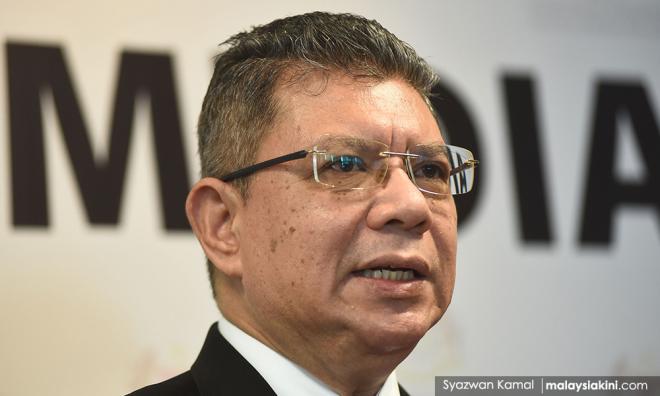
Centre for Independent Journalism Malaysia (CIJ) executive director Wathshlah Naidu has condemned continued investigations and charges under Section 233 of the Communications and Multimedia Act (CMA).
Naidu said Section 233 of the Act is being used to suppress dissent despite Communications and Multimedia Minister Saifuddin Abdullah (photo, above) stating that he would look into the matter.
"The CIJ strongly condemns the continued use of Section 233 of the CMA despite Minister Saifuddin Abdullah's pledge to look into the Act last month.
"We call for all related investigations and future arrests to be halted and charges to be dropped.
"We view with concern that since the change in government at the federal level in February 2020, individuals voicing dissent against the authorities have been charged or investigated under Section 233 of the CMA," she said in a statement today.
Naidu said these individuals include Center to Combat Corruption & Cronyism (C4) founder Cynthia Gabriel, Malaysian Crime Watch Task Force (MyWatch) chair R Sri Sanjeevan, activist Fadiah Nadwa Fikri, Big Blue Taxi Services founder Shamsubahrin Ismail, Kuala Langat MP Dr Xavier Jayakumar, and South China Morning Post correspondent Tashny Sukumaran.
Yesterday, it was reported that Gabriel was called in for questioning on a police probe related to C4's March 14 letter titled "Anti-corruption rhetoric will never purify the unelected Perikatan Nasional gov't".
Also yesterday, Sanjeevan was charged under Section 233 with transmitting false communications on the police.
"Section 233 of the CMA is deeply problematic for its over-broad definitions accompanied by heavy punishment that infringes upon the constitutional right to freedom of expression," said Naidu.
She highlighted that the section allows for persons to be imprisoned for up to one year and fined up to RM50,000 for posting offensive content that annoys another person.
"This goes far beyond the legitimate restrictions allowed on the freedom of expression such as preventing incitement to violence or for national security.
"Freedom of expression is clearly enshrined under international human rights law, including the Universal Declaration of Human Rights and in our Federal Constitution.
"Freedom of expression and speech underpins the fundamental right to seek and exchange ideas, opinions and information that would enable the public to form their own opinions and allow for dissenting or alternative positions, specifically on issues of public interests, and ultimately promote good governance and hold the State to account," she added.
Naidu said that limits on the freedom of expression in law must be clear and narrowly defined, and serve a well-defined public interest function.
"These limits must also be necessary and proportionate, while measures adopted to address alleged online infringement must meet the harm test to determine legitimacy, necessity and proper.
"Criminalising content that could potentially challenge and attempt to hold the government to account is grossly disproportionate to any legitimate aim of protecting public order," she said.
Naidu said the government must immediately stop the use of regressive legal provisions such as Section 233 of the CMA to censor and silence dissenting and non-conforming voices.
"We need a healthy environment that promotes critical and thinking masses and not mere unthinking and conforming puppets in our society.
"Without any more delay, the new PN government, under Communications and Multimedia Minister Saifuddin Abdullah’s leadership, must review and adopt a moratorium on the arbitrary use of Section 233 of the CMA, besides moving towards repeal and amendment of its vague provisions in accordance with our Federal Constitution and international standards on freedom of expression," she said. - Mkini




No comments:
Post a Comment
Note: Only a member of this blog may post a comment.